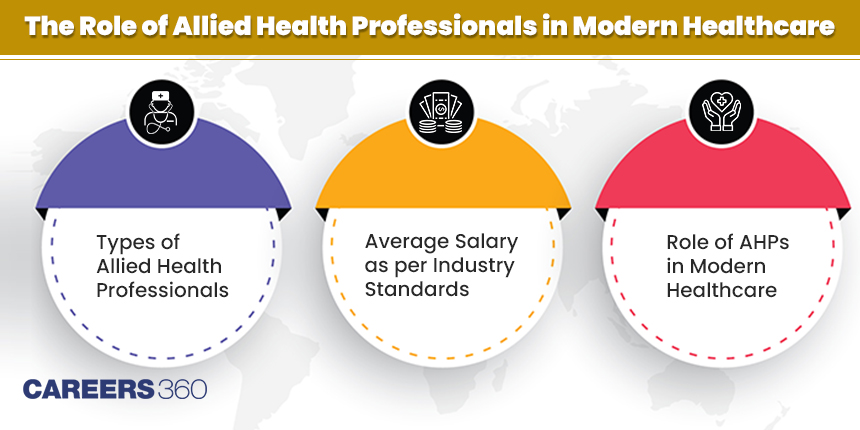Role of Allied Health Professionals in Modern Healthcare
Allied Health is a sector in the healthcare industry, separate from nursing, medicine, and pharmacy. Allied Health professionals (AHPs) are a group of health experts who contribute towards preventing, diagnosing, and treating several health conditions. They generally have specialised training in their specific job roles.

Allied Health professionals can work in different settings based on their job role. They can work at hospitals, private clinics, care centres, rehabilitative care, and community health. Allied Health professionals are different from other healthcare workers. While other healthcare workers diagnose and treat the patients directly, allied health professionals work alongside doctors, nurses, and other health specialists.
Allied Health professionals specialise in physical therapy, occupational therapy, radiography, and nutrition. There are different categories of Allied Health professionals including, Life Science professionals, Physiotherapy professionals, Renal Technology professionals, and Behavioural Health Science.
India currently has an unfulfilled demand of 30-40 per cent of Allied Health professionals. The need to bridge this gap has led to an increase in demand for Allied Health professionals. With the COVID-19 Pandemic, the investment in the healthcare industry has also increased significantly.
(Source: Business Standard)
Types of Allied Health Professionals
Allied Health professionals are important in assisting and caring for the patient. Apart from traditional medical roles, their expertise extends to nutrition, rehabilitation, and diagnostic imaging. In 2018, the government of India divided AHPs into 15 categories out of which some of the popular ones are discussed below.
Anaesthesiologist Assistant
Athletic Trainer
Cytotechnologist
Average Salary as per Industry Standards
Allied Health professionals or AHPs are a vital part of the healthcare workforce. Their salary may vary based on their expertise, experience, and specific roles they play in patient care. In the table below, candidates will find the salary structure of some of the popular job roles in Allied Health.
Job Profile | Average Salary |
|---|---|
Anaesthesiologist Assistant | Rs. 2.4 LPA |
Athletic Trainer | Rs. 3 LPA |
Audiologist | Rs. 4.2 LPA |
Dietitian | Rs. 3 LPA |
Salary Source: AmbitionBox
Role of Allied Health Professionals in Modern Healthcare
Allied Health professionals play a critical role in the healthcare system. They support the patients in their well-being. They play an important role in modern healthcare. Their specialised knowledge and training, allow them to treat specific health conditions which other health workers may not be equipped to handle.
Apart from physical health, they also take care of mental, emotional, and social aspects. They work in collaboration with other medical practitioners, this teamwork ensures all-around care for the patients. Unlike other professionals, they also focus on improving the day-to-day lives of the patients and improving the overall quality of life.
With recent technological advancements, the field of Allied Health is also evolving. New specialities are emerging such as medical laboratory technology, medical radiography, dialysis technology, and OT technology. Post-pandemic, there has been increasing demand for qualified Allied Health professionals.
AHPs help build a team-based healthcare facility, which helps in reducing the burden on doctors and nurses by supporting them whenever required. Due to factors such as higher incomes, lifestyle-related health issues, and emerging diseases, there’s an urgent requirement for professionals who can assist doctors.
Importance in Modern Healthcare
Allied health professionals are trained experts who work in specialised areas of healthcare, complementing the roles of physicians and nurses. They include physiotherapists, radiographers, laboratory technicians, occupational therapists, dietitians, speech therapists, optometrists, medical technologists, and many others.
Bridging the Gap: AHPs bridge the gap between doctors, nurses, and patients by ensuring smooth coordination of care.
Specialised Expertise: They provide technical skills that doctors may not specialise in, such as advanced imaging or rehabilitation therapies.
Holistic Care: By addressing physical, emotional, and functional aspects, they contribute to patient-centered care.
Improving Outcomes: Their role in rehabilitation, prevention, and health education reduces hospital stays and improves recovery rates.
Challenges Faced by Allied Health Professionals
Despite their importance, AHPs often face challenges such as lack of recognition, limited career growth opportunities, and workforce shortages. There is also a need for more awareness about their contribution among the public and policymakers.
To conclude, Allied Health professionals are very much required in the current scenario. They have specialised education relevant to their job roles. Post-covid it is clear that India's health force is under-staffed. It requires qualified health professionals who can assist and reduce the pressure on other healthcare workers.
According to a report published by the Ministry of Health and Family Welfare, India is in demand of 4.7 million allied health professionals. But, the actual availability falls within 800,000 to 1,100,000. With the increasing importance of Allied Health professionals, India needs to make developments in this sector.
Frequently Asked Questions (FAQs)
Medical terminology helps prevent errors in diagnoses and treatments by ensuring that everyone involved in a patient's care understands the same information, reducing the risk of mistakes. It contributes to furthering medical research.